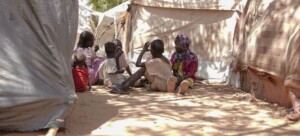Oxygen shortage forces Sudan hospitals to move patients between states
A shortage of oxygen at hospitals in Sudan is compelling medical facilities to transfer patients between states, the federal Ministry of Health has confirmed. Dr Montasir Osman, Deputy Director of the General Department of Emergencies and Epidemics at the Ministry of Health, acknowledged the lack of oxygen in some states which is resulting in the transfer of patients. This acknowledgement was a reference to the transfer of patients from El Gedaref to El Gezira.
 File photo: Save the Children
File photo: Save the Children
A shortage of oxygen at hospitals in Sudan is compelling medical facilities to transfer patients between states, the federal Ministry of Health has confirmed. Dr Montasir Osman, Deputy Director of the General Department of Emergencies and Epidemics at the Ministry of Health, acknowledged the lack of oxygen in some states which is resulting in the transfer of patients. This acknowledgement was a reference to the transfer of patients from El Gedaref to El Gezira.
He said that COVID-19 has spread in Red Sea state, Kassala, El Gedaref, River Nile state, North Darfur, and parts of North Kordofan. There are 38 treatment centres available in the country, of which 13 are in Khartoum. He indicated that 1,250 cylinders of oxygen has become available through Jeddah Development Bank, and it is being distributed to most states in Sudan.
Medicine shortage
As reported by Radio Dabanga last week, 58 per cent of essential medicines, including life-saving medicines, are not available anymore in Sudan.
In a statement on April 5, the Socialist Doctors Association (SDA) said that the health system in the country has collapsed. Most of the medicines are imported, and therefore have to be paid with hard currency that still remains scarce. The Professional Pharmacists Association of Sudan said at the end of March that the soaring prices of essential medicines have created a catastrophic situation where “some remedies now cost more than the minimum wage”.
In July last year, the Pharmaceutical Professionals Alliance painted a bleak picture of the availability of medicines in the country. At a press conference of Pharmaceutical Professionals Alliance in Khartoum on July 2, spokesman Salah Jaafar described the “unprecedented scarcity” as “disastrous, both in the public and private sectors”, as the volume of imported medicines during the past six months fell to nine per cent of the medications required in the country.
In 2016, Radio Dabanga already reported on the worsening “medicine crisis“ in the country. Many patients in Khartoum complained about shortages and soaring medicine prices.











 and then
and then